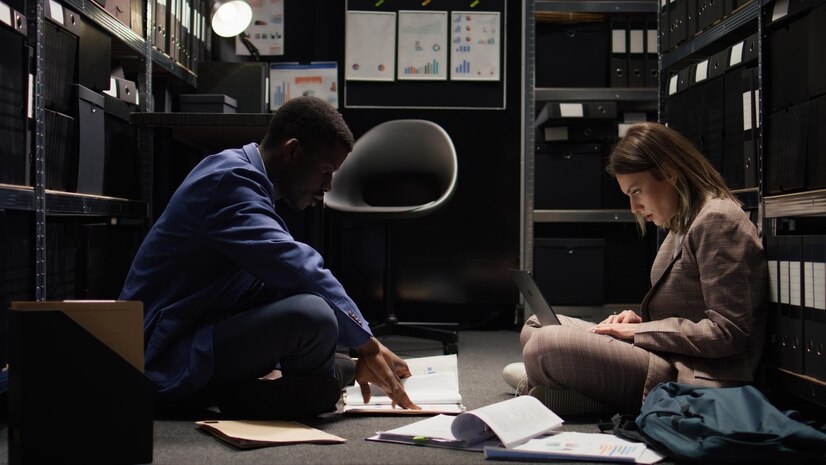LAW
How to Challenge the Evidence in a Criminal Case

Challenging the evidence in a criminal case can make or break your defense. If you’re accused of a crime, questioning the evidence against you is crucial. It’s not just about proving your innocence but ensuring the prosecution’s evidence holds up under scrutiny.
Understanding how to challenge this evidence can give you a powerful advantage in court. From spotting mistakes in how evidence was collected to questioning its relevance, knowing these strategies can make a big difference in your case’s outcome.
Understanding the Role of Evidence

Understanding the role of evidence is crucial when you’re involved in a criminal case. Evidence is what helps prove or disprove the claims made by both sides in court. If you know how evidence works, you can better prepare your defense or challenge what the prosecution is presenting.
Why Evidence Matters
Evidence is essential because it supports or weakens the arguments made by both sides. The prosecution needs evidence to prove the defendant is guilty, while the defense uses evidence to show that the defendant is not guilty or to create doubt about the prosecution’s case.
By understanding these types of evidence and their importance, you’ll gain a clearer perspective on how they fit into a criminal case and how they can be challenged or supported. For expert guidance, consider consulting a criminal lawyer Ottawa to help navigate these complexities effectively.
Common Types of Evidence and Their Challenges

Common types of evidence play a big role in criminal cases, but each type comes with its own set of challenges. Knowing what these types are and the issues they might face can help you understand how to question or defend against them effectively.
Physical Evidence
Physical evidence includes tangible items like fingerprints, DNA, or weapons found at a crime scene. While this evidence can be powerful, it’s not always perfect. It can be contaminated or mishandled, leading to doubts about its reliability. For instance, fingerprints can be smudged, making them hard to match.
Testimonial Evidence
Testimonial evidence comes from people who testify about what they saw or know. This can be eyewitnesses or experts who provide their opinions. The challenge here is that people can be mistaken or biased. Witnesses might have poor memory, or experts could have conflicts of interest that affect their testimony.
Documentary Evidence
Documentary evidence includes records like emails, contracts, or police reports. These documents are useful, but they can also be misleading if not properly verified. For example, an email might be altered, or a report might contain errors.
Digital Evidence
Digital evidence covers things like text messages, social media posts, or computer files. While this evidence is often very detailed, it can be tampered with or misinterpreted. Data can be deleted or hacked, and context can be misunderstood.
Legal Grounds for Challenging Evidence

Legal grounds for challenging evidence are key to defending yourself in a criminal case. If you believe the evidence against you is flawed or improperly obtained, you can argue that it should not be used in court. Knowing these grounds helps ensure that only fair and accurate evidence is considered.
Procedural Errors
One major ground for challenging evidence is procedural errors. This means if the police or investigators did not follow proper procedures when gathering evidence, it might be excluded from the case. For example, if they conducted a search without a warrant, any evidence found might be dismissed.
Chain of Custody Issues
Another important ground is chain of custody issues. This refers to the process of keeping evidence secure and properly documented from the crime scene to the courtroom. If there are gaps or inconsistencies in this process, it can suggest the evidence was tampered with or mishandled, making it unreliable.
Relevance and Admissibility
Challenging the relevance and admissibility of evidence is also crucial. Evidence must be directly related to the case to be used in court. If evidence is irrelevant or overly prejudicial, meaning it unfairly influences the jury, you can argue that it should not be admitted.
Expert Tips and Best Practices
Expert tips and best practices are essential when you’re challenging evidence in a criminal case. Following these guidelines can help you build a stronger defense and ensure that you’re making the most of every opportunity to question the evidence against you.
Consult with Forensic Experts
One of the best tips is to consult with forensic experts. These professionals can examine physical evidence, like DNA or fingerprints, and provide detailed analysis. Their expertise can reveal flaws or inaccuracies in how evidence was collected or analyzed, giving you a significant advantage in court.
Document Everything
Keeping thorough records is another crucial practice. Documenting every detail of the evidence, including how it was collected and handled, helps spot potential issues. This careful documentation can be valuable if you need to challenge the evidence’s credibility later on.
Stay Informed About Legal Standards
It’s important to stay updated on legal standards and changes in evidence laws. Knowing the latest rules and procedures can help you identify if any evidence in your case is being used improperly or if your rights are being violated.
Frequently Asked Questions (FAQs)
- What is evidence in a criminal case?
Evidence in a criminal case includes anything that helps prove or disprove the facts of the case. This can be physical items, documents, witness statements, or digital records.
- Why is challenging evidence important?
Challenging evidence is crucial because it can reveal flaws, mistakes, or biases in the evidence presented by the prosecution. This helps ensure that only reliable and accurate evidence is used to decide the case.
- What are common types of evidence in criminal cases?
Common types of evidence include physical evidence (like fingerprints or weapons), testimonial evidence (witness statements), documentary evidence (emails or police reports), and digital evidence (text messages or social media posts).
- What are some legal grounds for challenging evidence?
Legal grounds for challenging evidence include procedural errors (improper collection methods), chain of custody issues (gaps in evidence handling), and questions about relevance and admissibility (evidence not directly related to the case).
- How can forensic experts help in challenging evidence?
Forensic experts can analyze evidence like DNA or fingerprints to ensure it was collected and handled properly. Their expert opinions can help identify flaws or inaccuracies that may weaken the prosecution’s case.
Conclusion
In conclusion, challenging the evidence in a criminal case is a key part of defending yourself effectively. By questioning the evidence, you can uncover mistakes and inconsistencies that might work in your favor.
Remember, having a skilled attorney by your side can greatly enhance your ability to challenge evidence. Don’t hesitate to seek professional help to ensure you’re putting up the best defense possible.
LAW
Building a Strong Estate Plan: Essential Documents Everyone Needs

Creating an estate plan is one of the most important steps you can take to ensure your wishes are honored and your loved ones are protected. Whether you are planning for aging, incapacity, or the orderly transfer of wealth, having a clear set of documents is essential. Consulting with professionals who specialize in Mooresville Elder Law ensures that all legal nuances are addressed and your plans are thoroughly documented.
Life is unpredictable, but a thoughtful estate plan can minimize uncertainty, reduce family conflicts, and help your family avoid unnecessary expenses or legal hurdles. Even if you think you’re “too young” or “don’t have enough assets,” everyone benefits from a detailed strategy for their health care preferences, guardianship wishes, and distribution of savings or property after death.
Estate planning is not just for the wealthy; it’s for anyone who wishes to have a say in their care and asset management in the event of an unexpected occurrence. Without the proper documents, state laws and courts make those decisions for you, potentially contradicting your preferences and burdening your loved ones with avoidable complexity.
Last Will and Testament
Your will acts as the foundation of your estate plan. It allows you to declare how property, money, and personal possessions will be distributed after your death. More importantly, a will appoints an executor who will carry out your wishes and manage your final affairs. Parents of minor children can name a guardian to raise their children if they are no longer able to do so. Without a valid will, state laws will determine how your assets are divided, which can lead to outcomes you might not want for your heirs.
Durable Power of Attorney
A Durable Power of Attorney is an essential tool in comprehensive estate planning. It allows you to designate someone you trust to act on your behalf for legal and financial matters if you become incapacitated. This person can manage bill payments, property transactions, tax filings, and even business interests, helping to avoid costly, court-appointed guardianships. Incorporating a POA into your estate plan ensures that your affairs are handled smoothly, reducing stress and expense for your loved ones during an already challenging time.
Healthcare Power of Attorney and Living Will
Healthcare Power of Attorney
This document allows you to name an agent to make medical decisions on your behalf if you become unable to do so. Clear designation of a trusted decision-maker prevents uncertainty and maintains continuity of care, sparing family members the pain of disagreeing over treatment options during crises.
Living Will
A Living Will, also called an advance directive, communicates your preferences regarding life-sustaining measures and care at the end of life or in cases of severe incapacity. It’s critical for ensuring that your values and choices are respected by healthcare providers and loved ones alike. Together, these documents give your family clarity and authority during stressful times.
Revocable Living Trust
A revocable living trust enables you to transfer assets into a trust that manages them for your benefit during your lifetime and distributes them efficiently after your death. Unlike a will, it avoids probate, speeds up the transfer process, preserves your privacy, and can help with incapacity issues. These trusts are flexible, allowing changes to beneficiaries or terms, which is especially helpful for managing complex estates or multiple properties.
Beneficiary Designations
For accounts such as retirement plans, life insurance, and certain investment accounts, beneficiary designations determine the direct recipient of those funds upon your passing. These designations override instructions in your will, so it is essential to regularly review and update them, especially after significant life changes, such as marriage, divorce, or the birth of a child. Unupdated designations could inadvertently direct assets to unintended individuals, regardless of your current wishes.
Regular Review and Updates
Estate planning documents need regular updates to mirror life changes like marriage, divorce, new children, asset adjustments, or legal updates. The National Council on Aging recommends revisiting your estate plan every three to five years or following major life events. It’s advisable to include digital assets, personal instructions, or pet care directives. Maintaining current documents helps ensure your wishes are clear and eases the burden on your loved ones.
Conclusion
Taking a proactive approach to estate planning with the appropriate set of documents safeguards your wishes and eases decisions for your loved ones. By periodically reviewing and updating your plan with experienced professionals, you ensure control over your assets and healthcare, regardless of future events. The confidence gained from solid estate planning is priceless—not only for you but also for those you care about.
LAW
Andhra Law Times: Redefining Legal Journalism with Purpose, Integrity, and Impact

In an era where journalism is under intense scrutiny, legal media must do more than report cases or publish verdicts. The most respected platforms are those that combine sharp analysis, ethical rigor, and a commitment to social justice. Andhra Law Times is one such rising voice—an emerging leader in legal journalism that bridges traditional reportage with meaningful impact, shaping how law is understood, discussed, and applied in Andhra Pradesh and beyond.
This article delves into what makes Andhra Law Times distinct: its editorial philosophy, its alignment of performance with social responsibility, and why it represents the future of journalistic leadership in legal reporting.
Who Is Andhra Law Times?
Andhra Law Times is a legal news and commentary platform. Though relatively new on the landscape, it has steadily gained recognition for its nuanced reporting, expert commentary, and dedication to accessibility. It covers court judgements, legislative developments, public interest litigation, and rights issues—yet what sets it apart is how those stories are told: with clarity, context, and concern for the communities affected.
More than just breaking news, Andhra Law Times positions itself as a bridge: between judges and the public, between legal theory and lived experience, between governance and accountability. Its contributors include practicing lawyers, scholars, activists, and citizen journalists, all working together to ensure law is not just a formality, but a force for justice.
A Leadership Philosophy Rooted in Purpose
At the heart of Andhra Law Times lies an editorial philosophy built on purpose-driven journalism. Its core values include:
-
Empathy in Reporting
Stories are not just events—they’re about people. Andhra Law Times emphasises the human consequences of legal decisions, highlighting victims, underrepresented voices, and the socio-cultural contexts in which law operates. -
Integrity & Transparency
Legal journalism faces risks: misinterpretation, bias, sensationalism. Andhra Law Times insists on accurate sourcing, full context, and transparency about its editorial processes. Corrections are published openly; conflicts of interest are disclosed. -
Accessibility & Inclusion
Legal language is often arcane. To bridge the gap, Andhra Law Times translates complex judgments into clear writing, provides summaries, infographics, and local language versions. It works to ensure citizens—regardless of educational background—can understand their rights, obligations, and recourse. -
Social Justice Orientation
The platform does not shy away from covering issues that matter: rights of marginalized communities, environmental law, labor rights, gender justice. It aims to hold institutions accountable and to highlight systemic issues, not just isolated legal matters.
Bridging Performance with Impact
Leadership in legal media isn’t only about moral purpose; it’s also about excellence in execution. Andhra Law Times has managed to merge the two in a way that is compelling, sustainable, and socially important.
-
Quality Reporting: Articles are fact-checked diligently; legal specialists are consulted; and deeper features are produced—on constitutional law, administrative law, or public interest litigation—going beyond mere headlines.
-
Innovative Storytelling: Andhra Law Times uses multimedia—podcasts, video explainers, interviews, and infographics—to make dense legal topics more engaging. For example, a complex Supreme Court decision is broken down via animated explainer videos so people outside the legal profession can follow.
-
Community Engagement: Not just reporting on issues, Andhra Law Times partners with NGOs, legal aid societies, and law schools to host public forums, webinars, and workshops—helping citizens know where to find legal help, how to file complaints, how the law impacts daily life.
-
Sustainability & Ethics: Advertising is clearly marked; sponsored content is separated; the platform avoids sensationalizing sensitive legal issues for clicks. It also invests in its team: ensuring fair compensation for contributors, diversity of voices, and safe working conditions for reporting.
Influence in the Digital Age
Digital platforms are reshaping how people consume legal news. Andhra Law Times has embraced these changes wisely, seeing them as opportunities to amplify impact rather than mere traffic generators.
-
Social Media Advocacy & Education: Andhra Law Times maintains active presence on platforms like Twitter, Instagram, and LinkedIn, not just to share articles, but to spark conversation—debates on legal reform, rights, policy changes. Followers are encouraged to ask questions, share stories, and participate in democracy.
-
Thought Leadership: Editorials and op-eds are published that don’t just comment on legal issues but propose solutions: reforms to outdated laws, suggestions for improving access to justice, critiques of legal system inefficiencies. By doing so, Andhra Law Times positions itself as more than observer—it becomes a catalyst for change.
-
User-Generated Content & Local Voices: Recognizing that law plays out differently in small towns and villages, Andhra Law Times solicits articles and reports from local correspondents. Awareness of local customs, languages, and conditions helps it avoid a one-size-fits-all view.
Why Andhra Law Times Matters
In today’s socio-legal climate, legal information is power. Andhra Law Times matters because:
-
It builds legal awareness, enabling people to understand their rights, redress mechanisms, and how to participate in justice systems.
-
It enhances accountability, by shining light on judicial and governmental institutions, demanding transparency and reforms where needed.
-
It supports legal empowerment of marginalized groups who historically have lacked voice, resources, or representation.
-
It reinforces rule of law: in democracies, laws matter only if known, trusted, and fairly enforced. Andhra Law Times helps ensure laws don’t remain abstract but are applied in context, with fairness.
Challenges and Opportunities Ahead
Even as Andhra Law Times gains traction, its path is far from free of obstacles. Recognizing and navigating them will define its long-term success.
-
Balancing Speed with Accuracy: In breaking headlines, there is pressure to publish quickly. But legal reporting demands precision. Errors can mislead, harm reputations, or misinform the public.
-
Monetization without Compromise: Generating revenue—through subscriptions, advertising, sponsored content—can risk diluting editorial independence. Andhra Law Times must find models that support integrity.
-
Access in Rural & Underrepresented Areas: Internet access, literacy, language barriers are still obstacles. To have true impact, coverage must reach those who are least heard.
-
Maintaining Diversity of Voices: As platforms grow, institutional pressure, groupthink, or selection bias can creep in. Ensuring diverse contributors—not just legal professionals, but activists, grassroots leaders, local correspondents—is vital.
But each challenge is also an opening:
-
Investment in fact-checking tools, legal translation, local languages.
-
Subscription tiers, membership models, grants, partnerships with foundations.
-
Offline outreach: workshops, print summaries, radio, or community gatherings.
-
Mentorship programs for new writers, especially from underrepresented backgrounds.
Looking Ahead: The Vision for Andhra Law Times
The trajectory of Andhra Law Times signals a shift in what leadership in legal journalism can look like. As it continues to evolve, it may achieve several new milestones:
-
Expanding its regional reach, possibly beyond Andhra Pradesh, into national or pan-South Indian legal coverage, while retaining its local flavor.
-
Establishing a legal education wing: training programs for law students, paralegals, or community legal educators.
-
Building a repository of legal resources: free guides, searchable databases of judgments, easy-to-use toolkits for citizens.
-
Collaborations with tech platforms: legal tech startups, AI summarization of judgments, mobile apps for citizens to lodge grievances or track cases.
-
Advocating for policy reforms: using its platform to influence legislation, access to justice reforms, or judicial procedural improvements.
A Model for Leadership in Journalistic Purpose
Andhra Law Times is more than a news platform—it’s a model of what leadership in legal journalism can become. It embodies the idea that success is not just about reach or clicks—but about trust, impact, and responsibility. In a time when law shapes everyday life—during pandemics, environmental crises, social movements—the need for legal journalism that is reliable, empathetic, and justice-oriented is greater than ever.
By combining performance with purpose, Andhra Law Times demonstrates that journalism, especially around something as crucial as law, need not choose between integrity and influence. Its journey shows that ethical leadership in media is not just inspirational—it’s essential.
LAW
Child Custody Challenges: Understanding Your Rights and Options

Navigating child custody can feel overwhelming, especially during an emotional time. Understanding your rights and options is the first step to making confident, informed decisions.
Whether facing a divorce, separation, or a change in family circumstances, knowing what to expect helps reduce stress and protect your child’s best interests. Custody challenges vary, but you don’t have to face them alone.
With the right knowledge and support, you can work toward a solution that ensures stability and care for your child. Let’s break down the key points so you can move forward with clarity.
The Impact of Domestic Violence
Domestic violence can have a serious effect on child custody decisions. Courts always prioritize the child’s safety and well-being, so any history of abuse is taken very seriously.
A parent accused of violence may face limited or supervised visitation, or in some cases, lose custody altogether. Even if the child wasn’t directly harmed, witnessing violence can impact their emotional health.
That’s why it’s important to bring all facts forward. If you or your child is in danger, seeking legal and protective help right away is key to keeping everyone safe and ensuring a fair custody arrangement.
Geographic Relocation and Custody Changes
If one parent wants to relocate, they often need permission from the other parent or the court. The court will consider how the move affects the child’s schooling, family relationships, and overall stability.
Even if the move is for a job or a better life, it must still support the child’s best interests. If parents can’t agree, a judge will decide based on the facts.
Planning and communicating openly can help avoid unnecessary conflict and stress for everyone involved.
Substance Abuse Issues
Courts are careful to protect children from unsafe or unstable environments. If there’s evidence of drug or alcohol misuse, the court may limit custody or require supervised visits.
But it’s not always permanent. A parent who seeks help and shows improvement may regain custody rights over time. The focus is always on what’s best for the child.
Support from counselors, treatment programs, and legal professionals can make a big difference in moving forward in a healthy, safe direction.
The Role of Mediation in Custody Disputes
Mediation offers a peaceful way to handle custody disagreements without going to court. A trained mediator helps parents talk through their concerns and find workable solutions together.
This process is often quicker, less expensive, and less stressful than a court battle. Mediation focuses on cooperation and puts the child’s needs first.
With guidance from trusted professionals like this Springdale car accident lawyer, parents can find fair agreements that work for both sides.
Choosing mediation can help families move forward with less conflict and more understanding, which is important when children are involved.
Protecting Your Child’s Best Interests
Protecting your child’s best interests is the heart of every custody decision. By staying informed and seeking the right support, you can make choices that lead to a brighter, more stable future.
Don’t face custody challenges alone. Reach out to trusted legal professionals who can guide you every step of the way. Your child deserves security, care, and a plan that puts them first.
Did you find this article helpful? Check out the rest of our blog now!
-

 HEALTH2 years ago
HEALTH2 years agoIntegrating Semaglutide into Your Weight Loss Plan: A Practical Guide
-

 HOME IMPROVEMENT2 years ago
HOME IMPROVEMENT2 years agoHow to Choose the Perfect Neutral Area Rug for Every Room
-

 FASHION2 years ago
FASHION2 years ago7 Celebrity-Inspired Elegant Summer Dresses For 2024
-

 LAW2 years ago
LAW2 years agoTeenage Drivers and Car Accidents in California: Risks and Parental Liability
-

 CONSTRUCTION2 years ago
CONSTRUCTION2 years agoConstruction Site Safety Regulations in New York and Your Rights as a Worker
-

 LAW2 years ago
LAW2 years agoPost-Divorce Considerations in California: Modifications and Long-Term Planning
-

 HOME2 years ago
HOME2 years agoSandra Orlow: The Teen Model Who Captivated the Internet
-

 FINANCE2 years ago
FINANCE2 years agoDigital Asset Management in Florida Estate Planning
